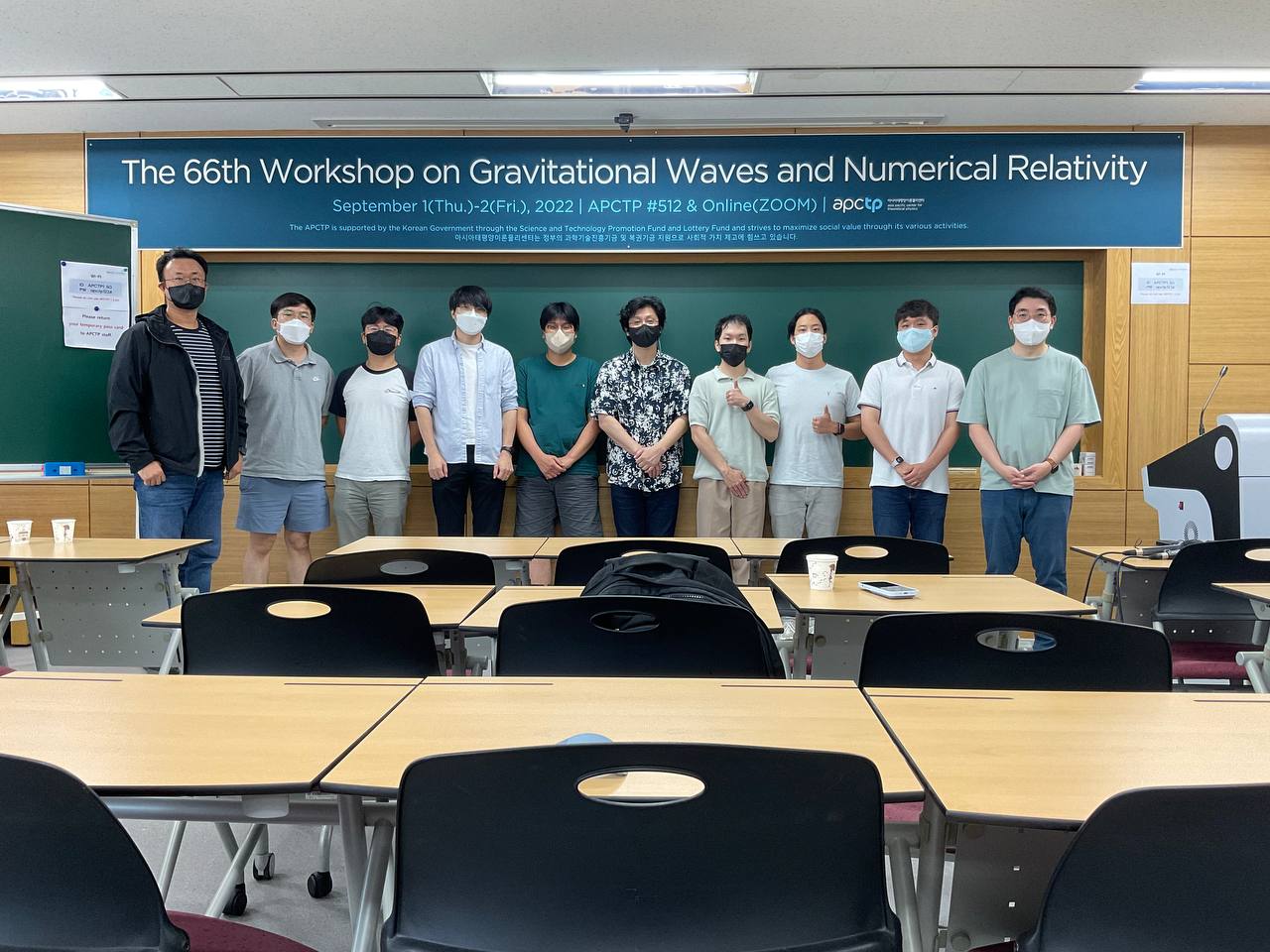Information
- Date: Sep. 1 (Thu.) - Sep. 2 (Fri.), 2022
- Venue: Rm #512, APCTP / Online (Hybrid)
- Audience: Researchers and students in astrophysics
- Number of participants: 15 Offline / 15 Online
- Format: Long and intensive sessions from basic lecture to the latest research with a comfortable atmosphere to ask questions and discuss freely
- Sponsor: APCTP
- Contact
- Chan Park: iamparkchan at gmail dot com
- Jinho Kim: jkim at kasi dot re dot kr
Program
- Time zone: Korea Standard Time (UTC+09:00)
- Sep. 1 (Thu.)
- 14:00 - 14:30 [Student Session] The novel signal detection for gravitational waves via auto-regressive approach (Sangin Kim / CNU)
- 14:30 - 15:30 [Graduate Session] An introduction to relativistic hydrodynamics simulation and its application (Jeongbhin Seo / PNU)
- 15:30 - 17:30 [Main Session 1] LIGO-Virgo-KAGRA detector and current status of gravitational wave detector technologies (June Gyu Park / KASI)
- Sep. 2 (Fri.)
- 10:00 - 12:00 [Main Session 2] Systematic errors in GW parameter estimation (Hee-Suk Cho / PNU)
Sessions
- The novel signal detection for gravitational waves via auto-regressive approach
- Speaker: Sangin Kim (CNU)
- Time: Sep. 1 (Thu.) 14:00 - 14:30
- Speaking Language: English
- Slide Language: English
- Abstract: For detecting signal on gravitational wave (GW) data, we have employed stochastic autoregressive (AR) model. This novel framework is focusing on improving noise reduction, event candidate detections, and template-free parameter estimation. For the preliminary result, we have tested our framework on black hole-black hole merger data, GW150914. The final goal of our study is to establish simplest and robust methodology automated by AR and anomaly detection to search GW signal and clean as clear as possible, so as to detect neutron star-neutron star merger (e.g. GW170817) which have longer observation time and weaker strain than black hole-black hole merger. Currently, we are examining all detected GW signals in GWTC-1 catalog.
- Slide File: Kim
- An introduction to relativistic hydrodynamics simulation and its application
- Speaker: Jeongbhin Seo (PNU)
- Time: Sep. 1 (Thu.) 14:30 - 15:30
- Speaking Language: Korean
- Slide Language: English
- Abstract: In an astrophysical environment, relativistic flow, for instance, a jet from a radio galaxy, plays an essential role in the interaction and dynamical evolution of the system. Relativistic hydrodynamic simulation (RHD) is a powerful method to investigate relativistic flow. Recently, we developed high order accuracy RHD code with a realistic equation of state. In this talk, basic concepts and numerical techniques of the grid based RHD code will be introduced. Through RHD simulation, we studied morphology, dynamics, and particle acceleration at strong radio galaxy jets which have ultra-relativistic speed. We briefly summarize these studies for advancing understanding of the RHD simulations.
- Slide File: Seo
- LIGO-Virgo-KAGRA detector and current status of gravitational wave detector technologies
- Speaker: June Gyu Park (KASI)
- Time: Sep. 1 (Thu.) 15:30 - 17:30
- Speaking Language: Korean
- Slide Language: English
- Abstract: The LIGO-Virgo-KAGRA is a gravitational wave detector based on large scale Michelson Fabry-perot interferometer. In order to detect gravitational wave, the arms of interferometer are consist of 4 km Fabry-perot cavity and its interaction length is more than 1000 km by multiple reflection of cavity. Various modern technologies such as Laser, Laser stabilization, ion beam sputtering, ultra-high vacuum, etc are used in the construction of gravitational wave detector and it can be expressed as state-of-the-art in modern engineering. The implementation and performance of the gravitational wave detector have already verified by detecting more than one hundred gravitational wave events through three observation run over past 6 years and improvement of the sensitivity by application of quantum non-demolition measurement(QND) is in progress. The principle of the gravitational wave detector and the technology used in the gravitational wave detector will be introduced, and the current status of the LIGO-Virgo-KAGRA detector will be introduced. In addition, I will explain quantum noise and QND technology. After than current status of QND measurement in KASI and international cooperation with KAGRA detector will be presented.
- Slide File: Park
- Systematic errors in GW parameter estimation
- Speaker: Hee-Suk Cho (PNU)
- Time: Sep. 2 (Fri.) 10:00 - 12:00
- Speaking Language: Korean
- Slide Language: English
- Abstract: In gravitational wave (GW) data analysis, the search efficiency depends on the accuracy of the waveform model. In GW parameter estimation, the recovered source parameters can be biased from the true parameter values, and these systematic errors are determined by how exactly the model can describe the true waveforms. A waveform from a merging compact binary system can be given by a function of various physical parameters, e.g. masses, spins, eccentricity, and tidal deformability. If a waveform model neglects some physical parameters to simplify the wave function, that gives systematic errors in the parameter estimation results. In this talk, I will give a brief overview of the GW search and parameter estimation and show how the recovered parameters can be biased when using inaccurate waveform models. And I will review some recent works showing the impact of eccentricity on parameter estimation.
- Slide File: Cho
Supports
- Accommodation * 1 night 2 days (Sep. 1 - Sep. 2) * Location: PIC
- Meals * Dinner on Sep. 1 * Breakfast on Sep. 2
Registration
- Link: Google Form
- Due
- Accommodation support or reservation is required: Aug. 18 (Thu.)
- Online participation or no accommodation: Aug. 31 (Fri.)
Photos
